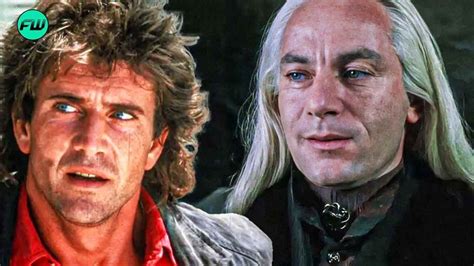
Jason Isaacs says Mel Gibson’s past antisemitic and racist remarks are “unforgivable,” but the two actors still maintain a cordial, albeit infrequent, texting relationship. Isaacs, who worked with Gibson on the 2000 film “The Patriot,” acknowledged the complexities of reconciling Gibson’s past actions with their current interactions, stating, “He’s done and said some incredibly horrible things.”
Jason Isaacs, known for his roles in the “Harry Potter” franchise and “Star Trek: Discovery,” has addressed his complicated relationship with Mel Gibson, acknowledging the actor’s past transgressions while revealing they still communicate via text. Isaacs, who starred alongside Gibson in the historical drama “The Patriot” (2000), didn’t shy away from discussing the controversy surrounding Gibson’s antisemitic and racist remarks, calling them “unforgivable.”
In a recent interview, Isaacs spoke candidly about the challenge of separating the artist from his art and the person from his past actions. He acknowledged the hurt and pain caused by Gibson’s words and actions, emphasizing that they should not be excused or forgotten. Despite this, Isaacs admitted that he occasionally exchanges texts with Gibson, highlighting the nuanced and often contradictory nature of human relationships.
“He’s done and said some incredibly horrible things,” Isaacs stated, underscoring the severity of Gibson’s offenses. This acknowledgment sets the stage for a deeper examination of the complexities of forgiveness, accountability, and the entertainment industry’s response to problematic figures. Isaacs’ willingness to address this issue head-on reflects a growing trend in Hollywood, where actors and filmmakers are increasingly being held accountable for their past behavior.
The controversy surrounding Mel Gibson is well-documented and spans several years. In 2006, Gibson was arrested for drunk driving and subsequently launched into an antisemitic tirade directed at the arresting officer. This incident marked a significant turning point in Gibson’s career, leading to widespread condemnation and a period of professional exile.
The Anti-Defamation League (ADL) and other Jewish organizations were quick to denounce Gibson’s remarks, calling them “hateful” and “offensive.” The incident sparked a broader debate about antisemitism in Hollywood and the entertainment industry’s responsibility to combat prejudice. Gibson later issued an apology for his remarks, but the damage to his reputation was already done.
In addition to the 2006 incident, Gibson has been accused of racism and misogyny on multiple occasions. Audio recordings of Gibson using racial slurs and making derogatory comments about women have surfaced over the years, further fueling the controversy surrounding his behavior. These incidents have led to calls for Gibson to be blacklisted from Hollywood and for his films to be boycotted.
Despite the controversy, Gibson has continued to work in Hollywood, both as an actor and director. He has starred in films such as “Edge of Darkness” (2010), “The Beaver” (2011), and “Blood Father” (2016), and has directed films such as “Apocalypto” (2006), “Hacksaw Ridge” (2016), and “Father Stu” (2022). His comeback has been met with mixed reactions, with some critics arguing that he should not be given a platform after his past behavior.
Isaacs’ decision to speak out about his relationship with Gibson comes at a time when Hollywood is grappling with issues of accountability and representation. The #MeToo movement has led to a reckoning in the entertainment industry, with numerous powerful figures being accused of sexual harassment and assault. This has prompted a broader discussion about the culture of silence and impunity that has long protected abusers in Hollywood.
The ongoing controversy surrounding figures like Mel Gibson raises important questions about the limits of forgiveness and the responsibility of the entertainment industry to address problematic behavior. While some argue that individuals should be given a second chance, others maintain that there should be consequences for actions that cause harm to others.
Isaacs’ remarks highlight the personal and professional dilemmas faced by those who work with controversial figures. He acknowledges the pain caused by Gibson’s actions but also recognizes the complexity of human relationships. His decision to maintain a cordial relationship with Gibson, while also condemning his past behavior, reflects the nuanced and often contradictory nature of morality.
The relationship between Isaacs and Gibson, as described by Isaacs, appears to be limited to infrequent text exchanges. This suggests a level of distance and perhaps a conscious effort to maintain boundaries. It’s important to note that maintaining contact doesn’t necessarily equate to condoning past actions. Isaacs has clearly stated that Gibson’s actions are “unforgivable,” demonstrating his understanding of the severity of the situation.
Isaacs’ comments also shed light on the broader issue of how society deals with problematic figures. Is it possible to separate the artist from their art? Can someone be forgiven for past transgressions, even if those transgressions are deeply offensive? These are questions that have no easy answers and continue to be debated in public discourse.
The entertainment industry, in particular, faces unique challenges in addressing these issues. Celebrities often have a platform and influence that can amplify their words and actions. This means that their behavior is subject to greater scrutiny and that they are held to a higher standard of accountability.
The case of Mel Gibson serves as a reminder that past actions can have lasting consequences, even for those who have achieved great success. While Gibson has been able to continue working in Hollywood, his reputation has been permanently tarnished. His past behavior continues to be a topic of discussion and debate, and he remains a controversial figure in the entertainment industry.
Isaacs’ willingness to speak openly about his relationship with Gibson is a testament to his integrity and his commitment to holding people accountable for their actions. He has shown that it is possible to acknowledge the complexities of human relationships while also condemning harmful behavior. His remarks provide valuable insight into the challenges of navigating the moral landscape of Hollywood and the importance of speaking out against injustice.
The broader implications of this situation extend beyond the entertainment industry. The questions raised by Isaacs’ comments are relevant to all aspects of society. How do we deal with people who have committed harmful acts? How do we balance the desire for forgiveness with the need for accountability? These are questions that we must all grapple with as we strive to create a more just and equitable world.
Ultimately, Isaacs’ remarks about Mel Gibson serve as a reminder that actions have consequences and that no one is above accountability. While forgiveness may be possible in some cases, it should not come at the expense of justice or the well-being of others. The entertainment industry, like all sectors of society, must continue to strive for a culture of accountability and respect, where harmful behavior is not tolerated and where victims are supported and empowered.
The discussion initiated by Isaacs also touches upon the concept of “cancel culture,” a phenomenon where individuals are ostracized or boycotted for past actions or statements deemed offensive. While some argue that cancel culture is a necessary tool for holding people accountable, others contend that it can be overly punitive and can stifle free speech. The case of Mel Gibson is often cited in debates about cancel culture, with some arguing that he has been unfairly targeted and others maintaining that he deserves the consequences he has faced.
Isaacs’ nuanced perspective offers a middle ground in this debate. He acknowledges the harm caused by Gibson’s actions but also recognizes the possibility of personal growth and change. His willingness to maintain a limited relationship with Gibson suggests a belief in the potential for redemption, while his condemnation of Gibson’s past behavior underscores the importance of accountability.
The entertainment industry’s response to problematic figures is often influenced by financial considerations. Studios and production companies may be hesitant to blacklist individuals who have a proven track record of box office success. This can create a conflict between ethical principles and economic interests, making it difficult to hold powerful figures accountable for their actions.
The case of Mel Gibson illustrates this dilemma. Despite the controversy surrounding his behavior, Gibson has continued to be employed in Hollywood, suggesting that his talent and box office appeal outweigh the concerns about his past transgressions. This raises questions about the entertainment industry’s commitment to ethical behavior and its willingness to prioritize profit over principle.
Isaacs’ comments also highlight the importance of allyship in combating prejudice and discrimination. By speaking out against Gibson’s antisemitic and racist remarks, Isaacs is demonstrating his solidarity with marginalized communities and using his platform to promote a more inclusive and equitable society. Allyship involves actively supporting and advocating for those who are targeted by discrimination, and it is essential for creating meaningful change.
The entertainment industry has a responsibility to promote diversity and inclusion, both on and off screen. This includes ensuring that marginalized communities are represented in films and television shows and that individuals from these communities have equal opportunities to succeed in the industry. It also means holding individuals accountable for their discriminatory behavior and creating a culture where such behavior is not tolerated.
The ongoing discussion about Mel Gibson and figures like him underscores the importance of critical thinking and media literacy. It is essential to be able to evaluate information from various sources, to identify bias, and to understand the context in which events occur. This allows individuals to form their own informed opinions and to make responsible decisions about the media they consume.
The entertainment industry plays a significant role in shaping public opinion and influencing cultural norms. This means that it has a responsibility to promote positive values and to challenge harmful stereotypes. By creating content that is diverse, inclusive, and thought-provoking, the entertainment industry can contribute to a more just and equitable world.
In conclusion, Jason Isaacs’ remarks about Mel Gibson provide valuable insight into the complexities of forgiveness, accountability, and the entertainment industry’s response to problematic figures. His willingness to speak openly about his relationship with Gibson, while also condemning his past behavior, reflects a nuanced and thoughtful perspective. The broader implications of this situation extend beyond the entertainment industry, raising important questions about how society deals with people who have committed harmful acts and how we can create a more just and equitable world.
The entertainment industry’s ongoing struggle with issues of accountability and representation highlights the need for continued dialogue and action. By promoting diversity, inclusion, and ethical behavior, the industry can contribute to a more positive and responsible culture. The case of Mel Gibson serves as a reminder that actions have consequences and that no one is above accountability. It is essential to learn from the past and to work towards a future where harmful behavior is not tolerated and where victims are supported and empowered.
FAQs:
1. What were Mel Gibson’s “unforgivable” actions, according to Jason Isaacs?
According to the article, Jason Isaacs referred to Mel Gibson’s past antisemitic and racist remarks as “incredibly horrible things” and “unforgivable,” referencing well-documented incidents, including a 2006 antisemitic tirade following a DUI arrest, as well as other instances of alleged racism and misogyny.
2. How did Jason Isaacs and Mel Gibson work together?
Jason Isaacs and Mel Gibson worked together on the 2000 film “The Patriot,” where Isaacs played the villain, Colonel William Tavington, and Gibson starred as the protagonist, Benjamin Martin.
3. What is the nature of Jason Isaacs’ current relationship with Mel Gibson?
According to Jason Isaacs, their current relationship is limited to occasional text messages. While he doesn’t elaborate on the content of these texts, the context suggests a cordial but distant relationship, despite Isaacs’ condemnation of Gibson’s past actions.
4. How has Hollywood responded to Mel Gibson’s past controversies?
Hollywood’s response to Mel Gibson’s past controversies has been mixed. While he faced a period of professional exile following the 2006 incident, he has since returned to acting and directing. This comeback has been met with both criticism and support, sparking debate about forgiveness and accountability in the entertainment industry.
5. What broader issues does the Jason Isaacs-Mel Gibson situation raise?
The situation raises broader questions about separating the artist from their art, the limits of forgiveness, the impact of “cancel culture,” and the entertainment industry’s responsibility to address problematic behavior. It also highlights the importance of allyship and promoting diversity and inclusion in Hollywood and beyond.









